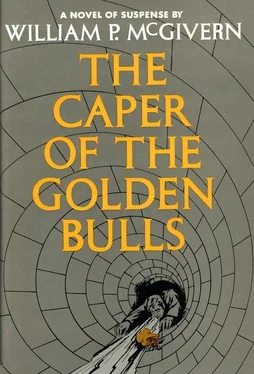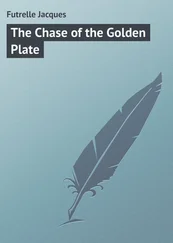Suddenly he sat up straighten He rubbed his hands together nervously and picked up the phone. In his ear the operator’s voice sounded, small and crisp: “Digame?”
Peter let out his breath and replaced the receiver in its cradle. He had an electrical link to the outside world But how could he use it?
He stood and paced in front of the desk, frowning at the phone. In his career, he realised, he had departed the scenes of crimes by a variety of means: fast cars, aeroplanes, a tractor on one occasion, a helicopter on another, and in Venice, this was by speedboat.
But he had never had an occasion to use the most conventional method of all, and he wondered if this were the time to chalk up a first. He decided it had to be. Peter said a hasty prayer, which he realised he could expect no results from, and picked up the telephone. When the operator answered, he said: “If you please, I’d like to order a taxi. Yes... now let me tell you where I’ll be standing...”
The cab driver was a plump, middle-aged philosopher who relished arguments with Authority, not because he believed he might ever win one, but because he believed he served a useful function in keeping Authority awake and on its toes. What he feared was a drowsy Authority, for he believed that the somnolent exercise of power created excesses; orders given with yawns, surveillance through sleepy eyes, and the like.
And so, for the third time, he said to the policeman: “My dispatcher directed me here. I don’t drive about whimsically.”
Horns sounded behind him. He had stopped at the intersection of the passageway and the street.
The policeman, whose name was Carlos, blew his whistle and waved an arm. “You’re blocking traffic. Drive on.”
“Permit me to make one point. Think of the client who ordered this taxi. Think of my dispatcher. And think of me, please. I am not a free agent. I am an instrument serving the orderly—”
“Drive on! Drive on!”
“—needs of transport in our city,” Carlos blew his whistle. The stalled traffic raised a clamour that soared in dizzying blasts above the plaza.
“A last point if you please.”
“No! No!”
“Very well, I have tried—”
Peter tapped Carlos on the shoulder. “Excuse me, please.”
Carlos turned and blinked at him. “Yes, of course.”
Peter climbed into the cab and gave the driver the name of his hotel.
“One moment,” Carlos said.
“Yes?”
Carlos frowned uncertainly at Peter. “Senor Churchman?”
“Why, yes.”
“We’ve met before, I think.”
“Oh yes, so we did.”
Horns honked. The driver sighed. “May I proceed?”
“No. One moment.” Carlos scratched his ear and looked down the passageway, studying its blank walls and barred windows. Senor Churchman had emerged from this passageway, which was quite literally impossible. As Carlos pondered the puzzle, his fingers trembled for a pencil and notebook, and the official phrases to describe the incident began to march in orderly sequence through his mind. But then he recalled that Senor Churchman had earned the right to wear the Order of the Blue Star. And he recalled too, with a pang of self-pity, the icy smile of the superior who had lectured him with such exquisite sarcasm on the distinction between the calls of duty and the calls of nature.
Carlos sighed and waved the cab on.
The watering trucks had gone and the breezes in the Plaza del Castillo were fragrant with the clean smell of damp earth and flowers. Lights from the cafés bordering the square gleamed softly on the wet pavements and sidewalks. In the gutters the frothing water was crested with cigarette stubs and artificial flowers and torn bull fight tickets. And down all the drains in steady streams sailed business cards and matchbook covers with addresses and telephone numbers scribbled on them.
Waiters stood at ease in the terraces of the cafés, cheerfully attentive to half-filled tables. No fire-bulls exploded in the streets, no rockets or drums shook the air, and no lines of dancers twisted through the plaza for the week of San Fermin had come to an end.
It was a bitter-sweet moment, a time to forget passion and excitement, a time to return to the matters of a practical world, but passion could not be forgotten so easily, so quickly, and a residue of it seemed to tremble on the quiet air, like the melody of a half-remembered song; but in those faint echoes, fainter with each passing moment, was the promise of the eventual silence, the inevitable loss, that would tend the wake of the death of passion.
“Peter, you must keep one simple fact in mind, and you must cheer up,” Morgan said.
“And what is that simple fact?”
“Well, let me see.” Morgan frowned and stroked his lush blond beard. “It’s quite easy to give way to doubt and confusion. It’s a question of getting off the tracks.” He tapped his forehead significantly. “Up here. I’m beginning to have an uneasy feeling about heretics, Peter.”
Peter was silent. He had no heart for talk; his world lay in pieces at his feet, and he was certain that no one least of all himself could ever make it whole again.
“Well, that’s one way of looking at it, I suppose,” Morgan said. “Heretics, you see, allow the engine of faith to leap, that’s it, leap off the tracks of conviction.” He looked at the sky, frowning. “Yes. To leap off the tracks of conviction — and, yes, plunge, that’s it, plunge into the gorges of error.”
“As it were,” Peter said wearily.
“Yes. As it were. So don’t let that happen to you, Peter. Just remember this one simple fact: She did it all for you. Everything Grace did was for your sake.”
“I once had an enormous talent for self-delusion. I’m praying it hasn’t deserted me. Because I want to believe you.”
They sat at a table on the terrace of the Café Kutz looking out across the dark expanse of the Plaza del Castillo.
“But you must, Peter. You must. Don’t get off the track. She knew Angela didn’t intend to play fair. Those were her exact words. Grace has very strict notions about fair play, you see.”
“Against all the evidence to the contrary, I’m trying to believe that too.”
But no matter how hard he tried, Peter could not believe; he could not even pretend to believe; and there was no logic yet devised or conceived that could brace his spinning thoughts.
For it had not been Angela who had arrived three minutes early at the bank; it had been Grace!
“Fair play means everything to her,” Morgan said, nodding judiciously. “That’s why she ordered the Cabezuda made. That’s why she made me carry it to the bank. Before Angela got there.”
Peter shook his head helplessly. He couldn’t speak.
“I’m quite strong, you know,” Morgan said with a sigh. “It caused a great deal of trouble in schools. Because I had an aversion to things. They used to get at me.” He smiled gently; happy lights sparkled in his eyes. “Then I had to break them up. I broke up the boiler in a school once. It kept making popping noises at me. But that’s all over. It’s people now. Lawyers, heretics, that sort of thing. So cheer up. She did it all for you, Peter.”
The majestic ingenuity of her betrayal, had left Peter without a reed of hope to cling to.
“Then where is she?”
“Well, I don’t know.”
“Where are the diamonds?”
Morgan frowned and tapped his forehead: “She was a deep one. Do you remember Quince?”
“No.”
“Grace rather puts me in mind of old Quince. Deep sorts. Afraid of things causing rows. You would have liked Quince. He lives in Wales. Do you think we could find him?”
“I don’t know, and I don’t give a damn.”
Читать дальше












